
- This event has passed.
Society for Neuroscience Chapter Meeting
March 31, 2022 - April 1, 2022
WHAT: Society for Oregon/SW Washington Neuroscience Chapter Meeting
WHERE: VIRTUAL ONLINE EVENT; REGISTER/SUBMIT ABSTRACTS HERE
WHEN: Thursday, March 31 and Friday, April 1, 2022
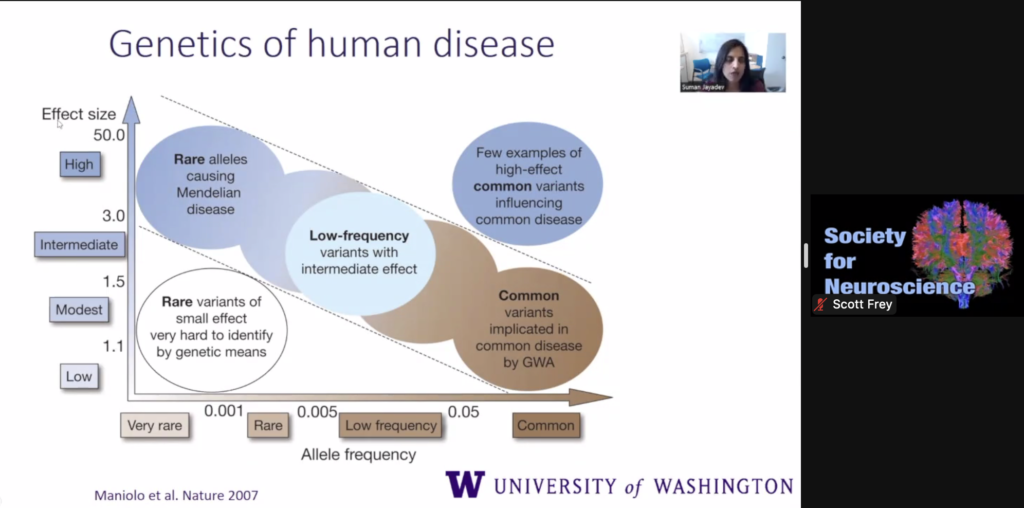
The Oregon/Southwest Washington Chapter of the Society for Neuroscience is meeting online this year.
Poster Viewing:
Poster presentations can be viewed at any time on our YouTube channel:
https://www.youtube.com/channel/UCPLc-vdofn-j23nkUU-GFIQ

NW Noggin volunteers include neuroscience undergraduates, graduate students, postdocs and artists, and both individually and collectively we present and attend local chapter meetings and international conferences for the Society for Neuroscience (SfN).

From their website: “The Society for Neuroscience is the world’s largest organization of scientists and physicians devoted to understanding the brain and nervous system.”
LEARN MORE: Noggin @ Society for Neuroscience

SfN Chapter Meeting AGENDA
Thursday, March 31, 2022
Mini-symposium on Neurogenetics
11:00 am Keynote Speaker: Suman Jayadev, University of Washington
Neurogenetics from the clinic to the bench
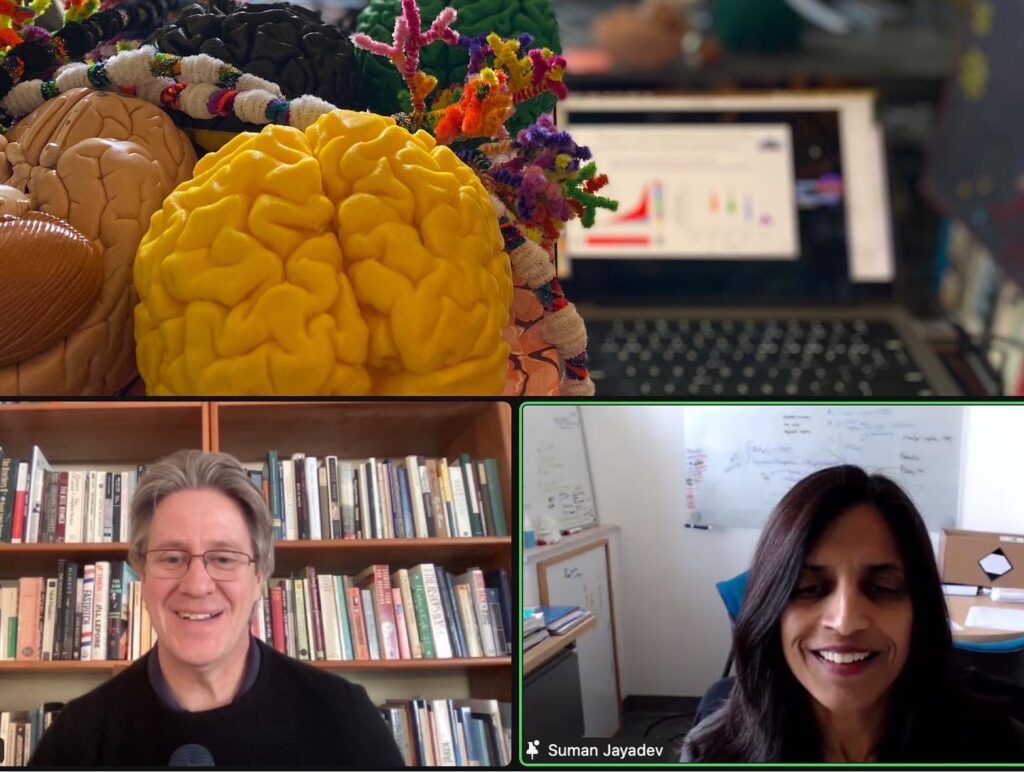
12:00 pm Soren Impey, Legacy Research Institute
Novel activity- and seizure-regulated non-coding genes

1:00 pm Tamara Phillips, OHSU
Neurogenetic analysis of differential susceptibility to methamphetamine intake


1:30 pm Betsy Ferguson, Oregon National Primate Research Center
Non-human primate models of genetic disease in the era of precision medicine
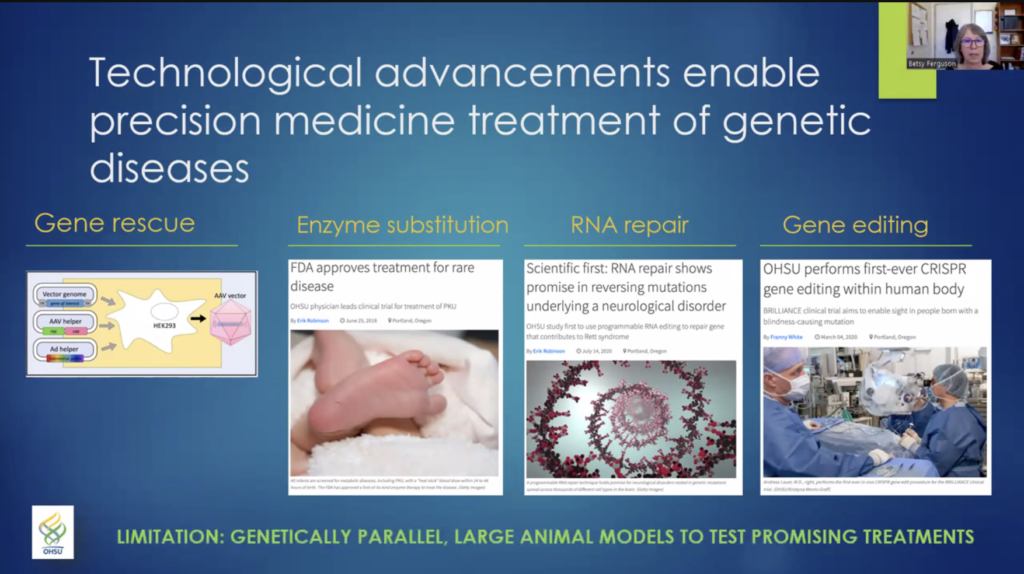
2:15 – 3:25 pm Poster Session I

3:30 pm Meeting Keynote Speaker: Susan Dymecki, Harvard Medical School
Embracing Differences: Heterogeneity in the brain serotonergic system


Friday, April 1, 2022
Speaker Session I
9:00 am Brice Kuhl, University of Oregon
Adaptive distortions of long-term memory representations

9:30 am Tua’au Laolagi, Southern Oregon University
The Effects of Exercise on Brain Activity in Older Adults Utilizing fMRI Analysis

9:45 am Caroline Hernandez, Oregon State University
Microbiota-gut-brain axis: Identifying Microbes that Directly Interact with Gut Sensory
Cells in Mice via Cell Cross-linking


10:00 am Emily Sackinger, Oregon State University
Cannabidiol affects NMDA receptors and memory differently between males and females in the 5xFAD mice

10:15 am Opal Stayer-Wilburn, Oregon National Primate Research Center
Astrocytic aquaporin-1 expression across age in rhesus macaques

10:30 am Break
10:45 – 11:45 am Poster Session II

Speaker Session II
12:15 pm Daniel Bradford, Oregon State Univerisity
Alcohol Stress response dampening and drug-induced neuroadaptations to uncertain stressors

12:45 pm Sudeshna Tripathy, Oregon National Primate Research Center
Fetal Brain Inflammation with Choriodecidual Ureaplasma Infection in Rhesus Macaques

1:00 pm Skylar Ferrara, OHSU
Thyromimetics modulate TREM2 expression on macrophages and microglia: implications for MS and other neurodegenerative diseases
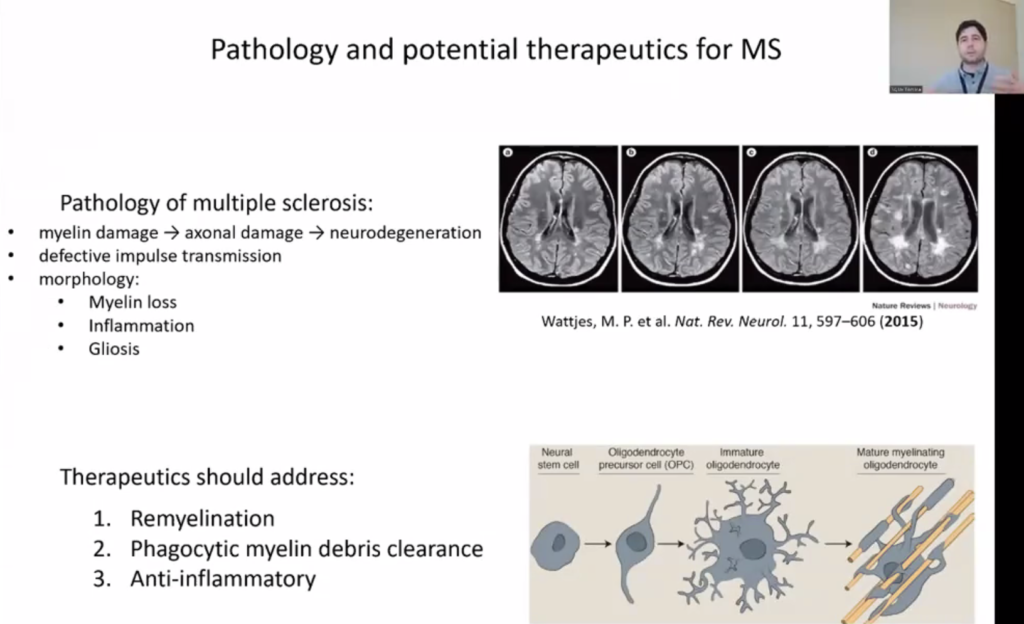
1:15 pm Steven Dash, Oregon National Primate Research Center
The rhesus macaque as a model of aging: MRI analysis

1:30 pm Elizabeth Wood, OHSU
COVID-19 Pandemic Exposure on Infant Sadness at 6 Months of Age is Mediated by Maternal Body Composition at the End of Pregnancy

1:45 pm Maria-Luisa Appleman, Oregon National Primate Research Center
Effect of hormone replacement therapy on amyloid beta expression in the amygdala of aged rhesus macaques

2:00 pm Break
2:15 – 3:45 am Poster Session III
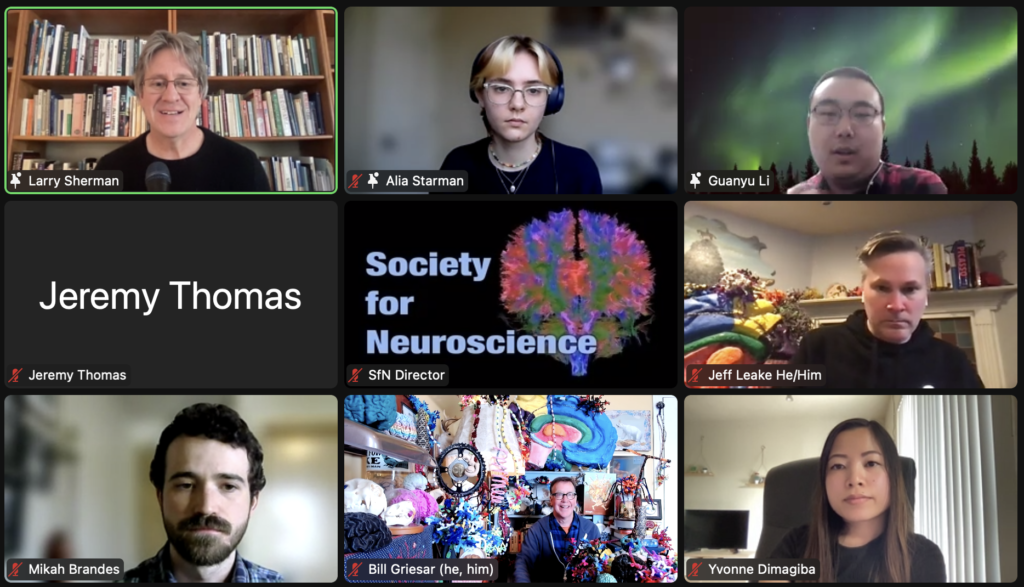
3:05 pm William Griesar and Jeff Leake, Portland State University
NW NOGGIN: Reconnecting our brains one cell at a time in a pandemic
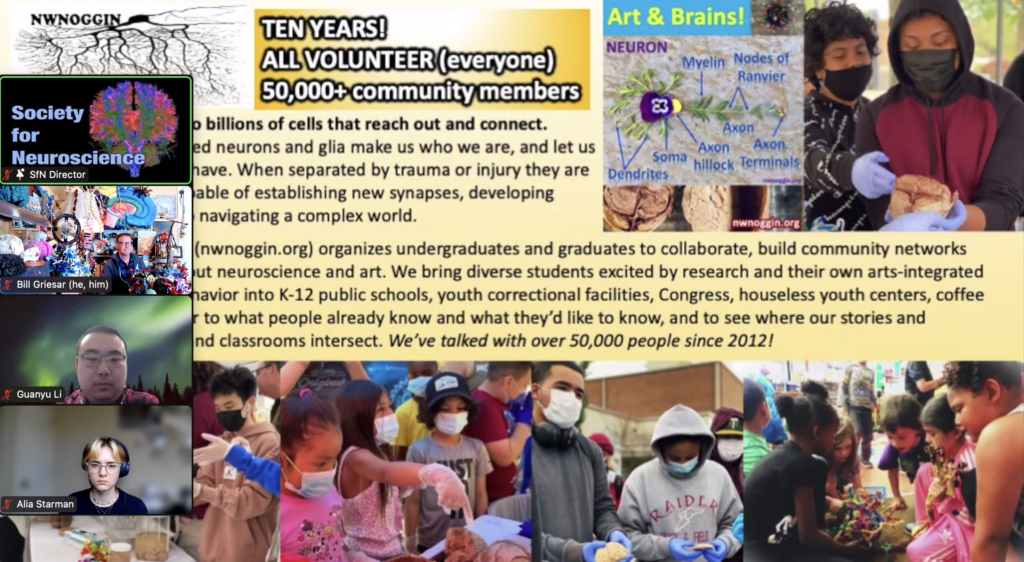
Speaker Session III
3:15 pm Vincent Costa, Oregon National Primate Research Center
Transcriptional and anatomical diversity of excitatory and inhibitory neurons in the primate amygdala


3:45 pm Awards and closing
NW Noggin Abstract
Reconnecting our brains one cell at a time in a pandemic

SLIDE SHOW: SfN OR Chapter Griesar Leake 2022
*W. S. GRIESAR 1,2,4, J. J. LEAKE 1,3;
1Northwest Noggin, Portland, OR; 2Psychology/Neuroscience, 3Univ. Studies, Portland State Univ., Portland, OR; 4Behavioral Neurosci., OHSU, Portland, OR

Our brains are home to billions of cells that reach out and connect. These networks of linked neurons and glia make us who we are, and let us perceive, think and behave. When separated by trauma or injury they are remarkably plastic, capable of establishing new synapses, developing creative approaches to navigating a complex world.

Nonprofit NW Noggin (nwnoggin.org) organizes undergraduates and graduates to collaborate, build community networks and inspire people about neuroscience and art. We bring diverse students excited by research and their own arts-integrated study of brains and behavior into K-12 public schools, youth correctional facilities, Congress, houseless youth centers, coffee shops and pubs to hear what people already know and what they’d like to know, and to see where our stories and discoveries from labs and classrooms intersect. We’ve talked with more than 50,000 people since 2012!

In 2020, with COVID-19 suspending in-person outreach, we developed a new found object brain cell project we could engage in online. We asked people to look around their own environment and find objects that reminded them of neurons or glia. We asked: “Can you construct a brain cell out of things that you find? What objects for you represent the function of a glial cell, or neuron, or the function of specific parts of a neuron? Do these objects have personal meaning, or say something about you?” We brought this project to K-12 classrooms in the Pacific Northwest, Hawaii and Europe, and presented it through two global webinars in collaboration with BrainFacts.org, a public information initiative of The Kavli Foundation, the Gatsby Charitable Foundation and the Society for Neuroscience.

The brain cells created and posted online with the hashtag #showusyourbraincell are extraordinary – beautiful, compelling, informative – and offer windows into people’s individual lives and circumstances. Many took the opportunity to explain the materials used and their significance, connecting essential aspects of other fields and cultures to basic structural components of our brains.

A pandemic is traumatic, separates networks, and makes it hard to connect. Yet like our brain cells, we can adapt and find new approaches to our ever-changing world. Building excitement and awareness of discoveries, educational options and careers through interdisciplinary neuroscience outreach also trains new scientists to collaborate, engages more people, and increases awareness and support for community investment in both brain research and the arts.

LEARN MORE: Pandemic connections
LEARN MORE: Reconnecting Our Brains, One Cell at a Time
LEARN MORE: Action & Potential!
LEARN MORE: Returning to find a voice
LEARN MORE: Uploading your brain from Vancouver
LEARN MORE: Ho brah, he lolo maoli kēlā!
LEARN MORE: NogginFest 2021: Threshold Potential!
LEARN MORE: A crayon in Homer’s brain
LEARN MORE: Neurons in Minecraft & More!
LEARN MORE: Thank You Northwest Noggin!




